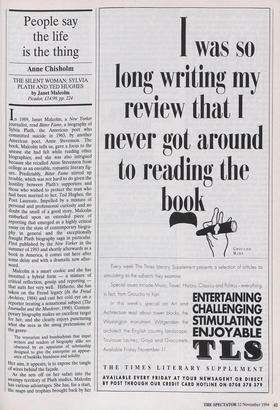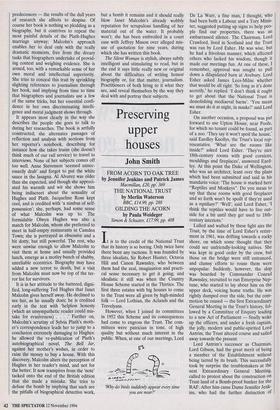People say the life is the thing
Anne Chisholm
THE SILENT WOMAN: SYLVIA PLATH AND TED HUGHES by Janet Malcolm Picador, £14.99, pp. 224 In 1989, Janet Malcolm, a New Yorker journalist, read Bitter Fame, a biography of
Sylvia Plath, the American poet who committed suicide in 1963, by another American poet, Anne Stevenson. The book, Malcolm tells us, gave a focus to the unease she had felt while reading other biographies; and she was also intrigued because she recalled Anne Stevenson from
college as an enviable, romantic literary fig- ure. Predictably, Bitter Fame stirred up trouble, which was not hard to do given the hostility between Plath's supporters and those who wished to protect the man who had been married to her, Ted Hughes, the Poet Laureate. Impelled by a mixture of personal and professional curiosity and no doubt the smell of a good story, Malcolm embarked upon an extended piece of reporting that emerged as a highly critical essay on the state of contemporary biogra- phy in general and the exceptionally fraught Plath biography saga in particular. First published by the New Yorker in the summer of 1993 and shortly afterwards as a book in America, it comes out here after some delay and with a dramatic new after- word.
Malcolm is a smart cookie and she has invented a hybrid form — a mixture of critical reflection, gossip and reporting that suits her very well. Hitherto, she has taken on the Freud legacy (In the Freud Archives, 1984) and cast her cold eye on a reporter treating a sensational subject (The Journalist and the Murderer, 1990). Contem- porary biography makes an excellent target for her, and she clearly enjoys puncturing what she sees as the smug pretensions of the genre:
The voyeurism and busybodyism that impel writers and readers of biography alike are obscured by an apparatus of scholarship designed to give the enterprise an appear- ance of banklike blandness and solidity.
Her aim, it appears, is to expose the tangle of wires behind the façade.
As she sets off on her safari into the swampy territory of Plath studies, Malcolm has various advantages. She has, for a start, the maps and trophies brought back by her predecessors — the results of the dull years of research she affects to despise. Of course her book is nothing so plodding as a biography, but it contrives to repeat the most painful details of the Plath-Hughes marriage anyway; Malcolm's approach enables her to deal only with the really dramatic moments, free from the dreary tasks that biographers undertake of provid- ing context and weighing evidence. She is armed, too, with a remarkable sense of her own moral and intellectual superiority. She tries to conceal this trait by sprinkling slighting references to journalism through her book, and implying from time to time that biographers and journalists use a few of the same tricks, but her essential confi- dence in her own discriminating intelli- gence and moral judgment shows through.
It appears most clearly in the way she describes the people she goes to talk to during her researches. The book is artfully constructed; she alternates passages of reflection and analysis with sections from her reporter's notebook, describing for instance how she takes trains (she doesn't think much of our rail service) to travel to interviews. None of her subjects comes off too well. Anne Stevenson 'seemed unnec- essarily drab' and forgot to put the white sauce in the lasagna. Al Alvarez was older than she expected, and though she appreci- ated his warmth and wit she shows him being indiscreet about the sexuality of Hughes and Plath. Jacqueline Rose kept cool, and is credited with 'a nimbus of self- possession'; she, perhaps, had some sense of what Malcolm was up to. The formidable Olwyn Hughes was also a match for Malcolm, whom she preferred to meet in half-empty restaurants in Camden Town; she is portrayed as obsessive and a bit dotty, but still powerful. The rest, who were unwise enough to allow Malcolm to visit them at home and usually provided lunch, emerge as a motley bunch of shabby, unreliable eccentrics. Biography may have added a new terror to death, but a visit from Malcolm must now be top of the ter- ror list for survivors.
It is in her attitude to the battered, digni- fied, long-suffering Ted Hughes that Janet Malcolm gives herself away. He declined to see her, as he usually does; he is credited early in the text with 'helpless honesty (which an unsympathetic reader could mis- take for evasiveness) . . . .' Further on, Malcolm's scrutiny of Sylvia Plath's moth- er's correspondence leads her to jump to a conclusion extremely damaging to Hughes: he allowed the re-publication of Plath's autobiographical novel, The Bell Jar, against her mother's wishes, in order to raise the money to buy a house. With this discovery, Malcolm alters the perception of Hughes in her reader's mind, and not for the better. It now transpires from the 'note' tacked onto the end of the British edition that she made a mistake. She tries to defuse the bomb by implying that such are the pitfalls of biographical detective work, but a bomb it remains and it should really blow Janet Malcolm's already wobbly reputation for scrupulous handling of her material out of the water. It probably won't; she has been embroiled in a court case with Jeffrey Mason over alleged mis- use of quotation for nine years, during which she has written this book.
The Silent Woman is stylish, always subtly intelligent and stimulating to read, but in the end it says little really new or original about the difficulties of writing honest biography or, for that matter, journalism. Practitioners of both bring to it what they are, and reveal themselves by the way they deal with and portray their subjects.



































































 Previous page
Previous page